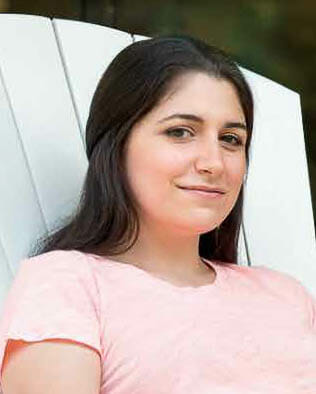The assignment was designed to apply key marketing concepts and hone problem solving, analysis, and decision-making skills, in order to impress the senior-level professionals who judged the final round of the competition.
Sarah Bourouphael and Jennifer Koffman made up the winning team, and for their impressive efforts they split a $1,500 competition prize.
“This exercise is a part of a larger learning program that provides students with tools to help them make messy, challenging, real world decisions,” said Assistant Professor Andrew Smith. “The competition also affords them the opportunity to interact and learn from the very professionals who are making these marketplace decisions.”
Three alumni volunteered to judge the final presentations for the case competition.
After making it through a preliminary round judged by Dean Mark Cordano, Associate Dean Julie Fitzmaurice and alum Bill Paul, three teams of finalists made presentations to the three alumni.
The judges for the finals included Karen Cambray, ’88, Michael Farrell, ’83, and Shauna Pieniazek, ’79.
Cambray is the chief financial officer for Cartera Commerce, of Lexington. She’s worked more than 20 years in executive finance, including early stage, emerging technology companies. She is Boston Business Journal’s 2014 CFO of the Year for the mid-size private company category.
Farrell is the chief operating officer at BAO (By Appointment Only), of Andover, where he’s responsible for day-to-day operations, the strategic direction and the company’s growth. Farrell has worked with established and fledgling companies as well as the public sector. His experience includes software, networking, and hardware solution sales, including field sales, service, and telesales management.
Pieniazek is the regional director of marketing and e-commerce for Marriott Hotels & Resorts. She oversees a team of marketing, eCommerce, and public relations managers covering the northeast from Pennsylvania through New England, and Canada.
Smith assigned his students the J.C. Penney case at the start of the fall semester, but first they had to analyze and develop solutions for other case studies that built on what they learned in class, Smith said. The competition case study focused on struggling retailer JCPenney.
The retailer has gone through well-documented problems in recent years. It’s been facing declining revenues and shrinking gross margins so it needs a strategic plan to get customers into the stores who are willing to pay full price for merchandise, Smith said.
JCPenney brought in Apple executive Rob Johnson to fix the retailer’s problems but he was let go in April 2013 after just 17 months on the job, with company sales plummeting.
Johnson couldn’t instill the same customer loyalty the electronics mega-giant Apple enjoys, Smith said.
Students studied marketing strategy, consumer behavior, marketing research and branding in class and were told to apply them toward the JCPenney case study.
“The students were instructed to use the marketing concepts, models, and theories we’ve talked about in class to address JCPenney’s problems,” Smith said.
Twenty-three students divided into nine teams for the assignment.
Each team was told to complete a marketing analysis and develop a strategic marketing plan for the company in a 15-page report for Smith. They presented the highlights of their plans in a 15-minute presentation to the school judges.
As part of the assignment, students were expected to examine the case facts and develop a solid understanding of the company’s problems in order to come up with sensible and cohesive solutions.
Students were told to look at company strengths and weaknesses, as well as consider external opportunities and threats, Smith said.
They looked at retailing, overall strategy, consumer behavior and communications with customers.
“Pricing is a big issue with J.C. Penney,” Smith said.
Bourouphaels and Koffman struggled between their academic and professional lives to carve out the necessary time for the project but that mirrored real-world business constraints, Bourouphaels said in an email. That meant they had to be adaptable and creative in their use of time.
“Jenny and I worked really well over the semester and on this project,” Bourouphaels said. “She was open to feedback, and I was so impressed with how she transformed in her presentation delivery over the semester.
The partners settled on a three-pronged approach to address brand confusion, high operating costs and net losses by focusing on strengthening the brand message, using event- and loyalty based discounting, and using omni-channel experience.
Smith coached the all teams and offered feedback to help refine the competitors’ plans before their presentations in front of the judges.
Dean Cordano then offered additional coaching to the three finalist teams as they prepared their presentations for the panel of three alumni judges.
Bourouphael and Koffman captured the essence of the problem, which was convincing consumers to pay full price for JCPenney’s merchandise, Smith said. Plans looked at loyalty programs, improved communications with consumers, and more disciplined promotions rather than blanket promotions.
The first round of judging was held Nov. 18-20 and the finals on Nov. 23.
Bourouphael and Koffman worked hard developing the solution and their presentation so winning was a validation of their work but also a relief, Bourouphael said.
“For me, it wasn’t about the money,” she said. “I was focused on the impressive profiles of the judges and the highly valuable, constructive feedback from the dean and assistant dean. I felt that making an impression and capitalizing on the feedback we were given was the real prize to be won, and I think we did that.”
Other finalists also included Peter Sison and James Frackleton; and Erin Blanchard and Lindsey Guiseppe.





